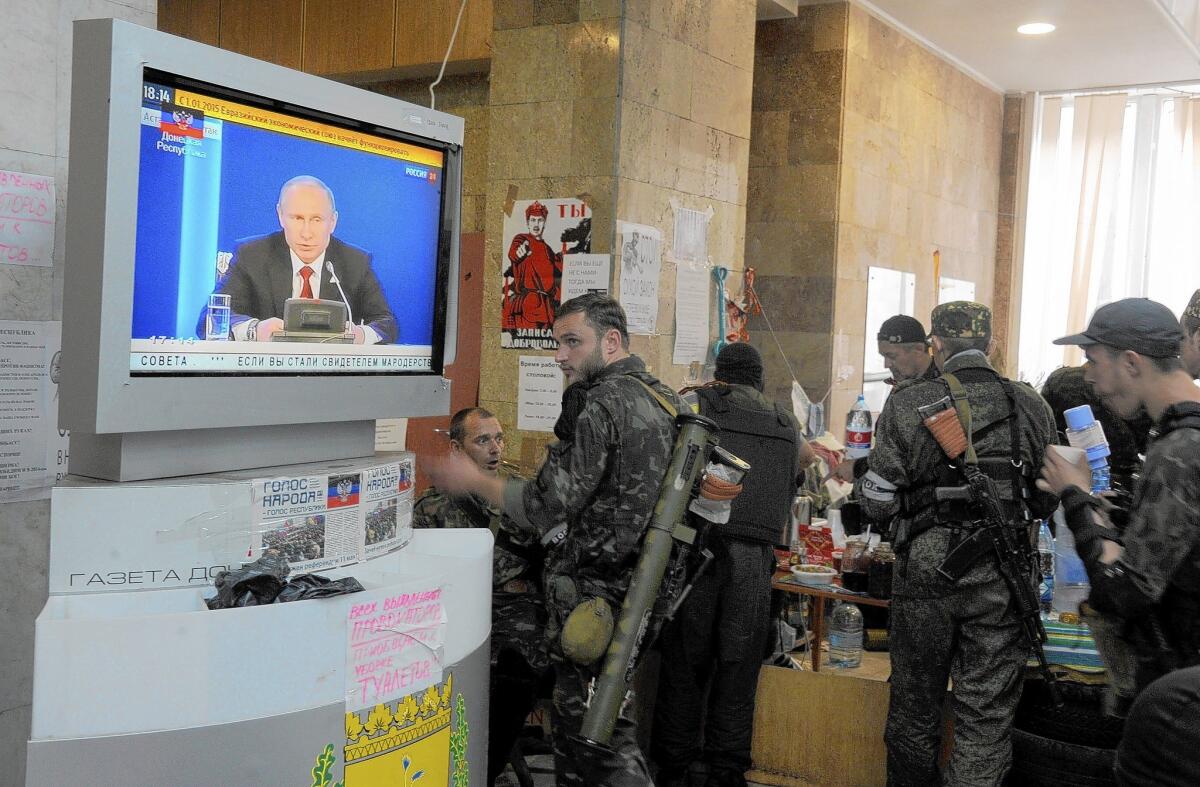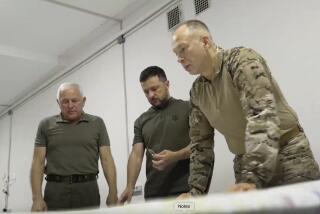Putin’s Ukraine ambitions hinge on allies he can’t rely on

- Share via
Reporting from KIEV, Ukraine — The prospect is alluring: long-term influence over a Russian-speaking corridor linking eastern Ukraine and Crimea, ensuring supplies of electricity, food, jet engines and other military hardware as well as unfettered access to offshore oil and gas fields.
The difficulty for Russian President Vladimir Putin in the next stage of the Ukraine conflict is the status of his best tool for achieving that goal: armed separatist groups. They may be in danger of losing momentum in their battle with the Ukrainian government. And even if they maintain their grip, they show signs of pursuing a rogue agenda that hurts Russia more than it helps.
Putin has kept a low profile in the days since Ukrainians elected a new president and government troops scored a rare success by preventing the pro-Russia separatists from taking over the country’s second-largest airport.
As the dispute drags on, it seems less likely that he will send in the troops who have been massed along the nations’ border. But the desire remains to rebuild Kremlin influence, lost in the collapse of the Soviet Union, across a region that manufactures hardware for the Russian defense industry.
Two areas already occupied by pro-Russia gunmen, Donetsk and Luhansk, provide the first half of a land corridor from southern Russia to Ukraine’s Crimean peninsula, which Putin annexed in March.
Nearby is the Zaporizhia region, home to the Motor Sich enterprise that produces jet engines for Russian transport and combat aircraft.
The final piece of the Russia-Crimea land bridge, the Kherson region, was the chief provider of electricity and food to the peninsula, which hosts Russia’s Black Sea fleet and potentially lucrative seaside resorts.
Russian dominance in Zaporizhia and Kherson would also ensure access to offshore oil and gas fields in the Sea of Azov that are operated by Russia’s Gazprom energy behemoth.
Farther west, the Mykolaiv and Odessa regions could provide a link to another isolated area of pro-Russia separatists, Moldova’s breakaway Transnistria region, uniting Russian speakers across the Black Sea coast and cutting off Ukraine from the important maritime outlet. Odessa, a city deeply rooted in Russian cultural history, was the scene of the deadliest fighting between insurgents and supporters of Ukrainian unity on May 2, when fierce clashes left 50 dead.
Petro Poroshenko, who won Ukraine’s presidential election Sunday, has vowed to halt the separatists’ seizure of Ukrainian territory and recover Crimea. He has denounced the militants as anarchic terrorists and said his government won’t negotiate with anyone taking up arms against the country.
Putin on Tuesday issued a vague warning to Kiev to cease its “punitive operation,” meaning its attempts to retake territory and key communications and transport facilities from the gunmen. It is unclear whether he will do more.
The Ukrainian army’s ability to thwart the separatists’ takeover of Donetsk’s international airport Monday boosted confidence in Kiev that the insurgency can be quelled if the incoming president makes wise military and security appointments. As heavy fighting continued Thursday around the eastern city of Slovyansk, Ukrainian forces suffered a setback. Separatists shot down a military helicopter, killing at least a dozen troops. A Ukrainian general was among the dead.
“Eighty percent of the people in Donetsk and Luhansk are tired of these dramatic disruptions from outside their borders,” said Ihor Smeshko, a retired general who heads Kiev’s Center for Strategic Studies and Analysis.
Smeshko, who was head of the Security Service of Ukraine a decade ago, said the “war tourists” who have come from Russia to sow instability in the south and east could be defeated within a month if Poroshenko quickly replaced the inept general staff appointed by his ousted predecessor, Viktor Yanukovich.
Smeshko said he thought Putin was surprised by Ukrainians’ decisive election of Poroshenko, who won 55% of the vote in a single round involving 21 contenders.
“Putin doesn’t understand the Ukrainian people,” Smeshko said of voters’ support for a united Ukraine, even in much of the Russian-speaking area. “His advisors on Ukraine were giving him wrong information, or else the czar didn’t want to listen to them and made his own choices.”
International security experts such as Igor Sutyagin of Britain’s Royal United Services Institute see Putin as having ensnared himself in a trap of his own making.
“The instability in the east of Ukraine is getting to be a liability for Putin,” Sutyagin said in a phone interview from his London office.
He pointed to the separatists’ seizure of the Donetsk railway station last week and their halting of trains carrying the region’s coal output to pressure mining magnate Rinat Akhmetov to abandon his support for Ukrainian unity. In doing so, they blocked crucial deliveries of coal needed by Ukrainian metallurgy enterprises producing missile components and military hardware under contract to Russia.
The gunmen also shut down a pumping station along the pipeline that carries Russian natural gas to Turkey, Sutyagin said.
Separatists in Slovyansk also confirmed Thursday that they were holding four monitors from the Organization for Security and Cooperation in Europe, a mission endorsed by Russia, one of the OSCE’s 57 member states.
“Russia cannot fully control what is going on in the east of Ukraine,” Sutyagin said. “The genie is out of the bottle and Putin cannot just order him put back in.”
The separatists now have their own agenda, in part because of Kremlin-directed propaganda that casts Europe-oriented Ukrainians as neo-fascists who are attacking the Russian-speaking minority.
Sutyagin said Putin was unpredictable because he decides his moves as events unfold, rather than following a long-range plan. “He might have great vision and good tactics but he doesn’t know anything in between,” he said.
Putin may have lost control of the insurgency but he can’t afford to cut it off completely. He needs allies in the occupied regions if they eventually revert to Kiev’s control. He also risks angering Russian nationalists if he is seen as abandoning a quest that inspired many to join the Ukraine fight.
“Putin has trapped himself because he raised public expectations to a very high level. It’s time to provide Russians with a new victory; it’s been two months since Crimea,” Sutyagin said. It’s possible, he said, that Putin will seize more territory he can ill afford to subsidize and in the process provoke a war with Ukraine.
More likely, he said, is that Putin will maintain low-grade support for the separatists for another month or two, while waiting for an opportunity to maneuver out of his predicament.
More to Read
Sign up for Essential California
The most important California stories and recommendations in your inbox every morning.
You may occasionally receive promotional content from the Los Angeles Times.














